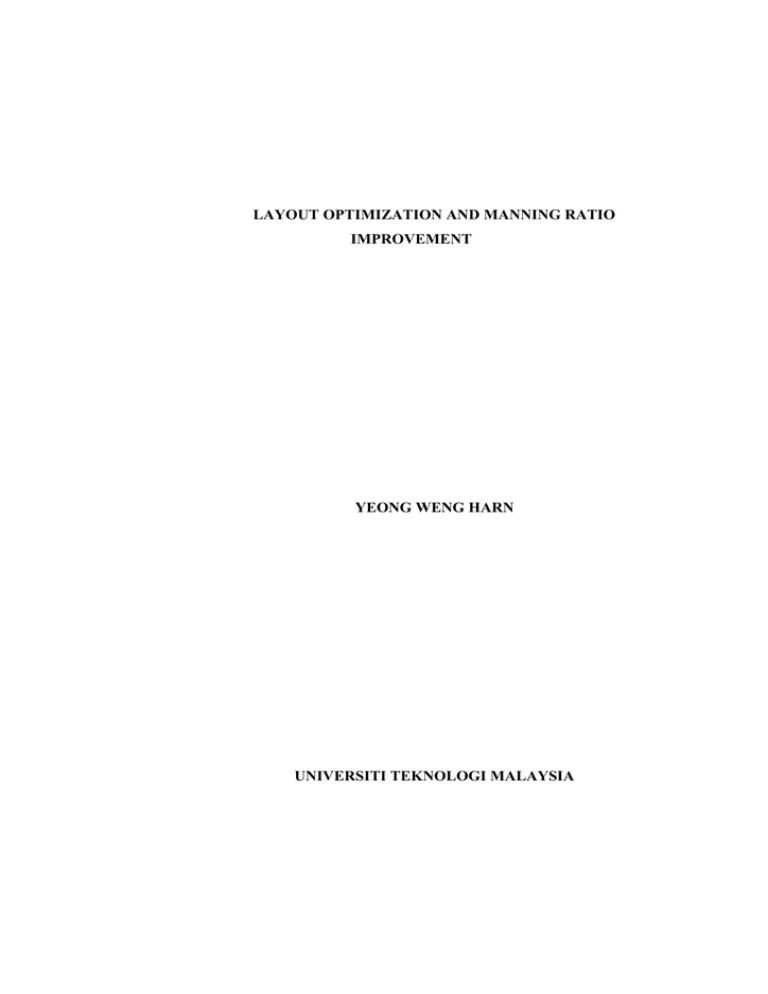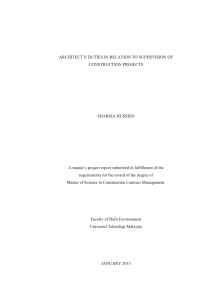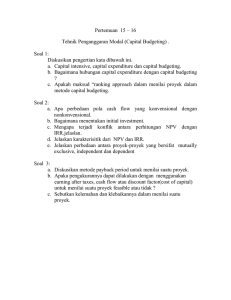i LAYOUT OPTIMIZATION AND MANNING RATIO IMPROVEMENT YEONG WENG HARN
advertisement

i LAYOUT OPTIMIZATION AND MANNING RATIO IMPROVEMENT YEONG WENG HARN UNIVERSITI TEKNOLOGI MALAYSIA i LAYOUT OPTIMIZATION AND MANNING RATIO IMPROVEMENT YEONG WENG HARN A project report submitted in partial fulfillment of the requirements for the award of the degree of Master of Engineering (Industrial) FACULTY OF MECHANICAL ENGINEERING UNIVERSITI TEKNOLOGI MALAYSIA MAY 2010 iii To my beloved mother and father iv ACKNOWLEDGEMENT Most importantly, I would like to express my greatest gratitude to my supervisor, Assoc. Prof Dr Abd Rahman Abdul Rahim . His professional guidance and support has certainly succeeded in bringing out the best in me during the completion of this project. I would also like to thank the Industrial Engineering panel of the Faculty of Mechanical Engineering, Universiti Teknologi Malaysia for the fullest co -operation in providing the necessary resourc es in completing this proj ect. My special thanks goes to Prof Dr. Sha’ri bin Mohd. Yusof and Assoc . Prof Dr. Masine binti Md. Tap for being the coordinators of the offshore Masters in IE program in Penang. Last but not least, I would like to thank my beloved parents, Yeong Soon Wooi and Lau Lai Chee for being the cheerleaders in my life. Not forgetting too are colleagues of mine who have always been my source of encouragement. Thanks to all of you. v ABSTRACT The objective of this study is to design a new layout for space optimization and improve manning ratio . An ergonomic new peripheral for IC bonding machine s is also designed to obtain space savings. The study is limited to the IC bonding process of one product on a single production floor of the factory with sampling done on one module containing two rows of machines. The study is divided into 3 major components which is layout optimization, manning ratio improvement and new peripheral design. Layout and peripheral design is mostly don e using AUTOCAD and work sampling methods is used widely in data collection of manning ratio. Data validation is done by surveying production floor workers on their feedback during the ‘trial -run’ of the new layout, manning ratio and peripheral design. A semiconductor manufacturer is selected for this case study. Upon completion of this study, additional machines can be fitted into existing space, manning ratio is improved requiring less manpower for more machines and a new peripheral which is space saving and ergonomic is designed. As a result, there is significant cost savings and improved productivity. Finally, the machine capacity gap to meet customer demand is closed. vi ABSTRAK Objektif utama kajian ini adalah untuk menghasilkan susun at ur mesin yang baru dengan tujuan untuk mengoptimumkan ruang dan mem pertingkatkan nisbah kerja. Rekabentuk baru yang ergonomik juga akan dihasilkan untuk perkakas bagi tujuan melengkapi pengoptimuman ruang . Kajian ini terhad kepada proses IC bonding untuk s alah satu produk yang diproses di satu tingkat dalam kilang. Sampling dijalankan untuk satu modul yang mengandungi dua baris mesin. Kajian ini dibahagikan kepada 3 komponen utama iaitu optimisasi ruang, peningkatan nisbah kerja dan rekabentuk perkakas baru . Kebanyakan kerja susun atur dan rekabentuk perkakas dijalankan dengan AUTOCAD manakala kaedah work sampling digunakan semasa mengumpul data nisbah kerja. Pengesahan data dijalankan dengan cara temubual dengan pekerja -pekerja kilang untuk mengetahui maklum balas mereka terhadap sesi trial-run yang dijalankan dengan susun atur, nisbah kerja dan rekabentuk perkakas yang baru. Sebuah kilang pembuatan semikonduktor dipilih untuk kajian ini. Setelah menghabiskan kajian ini, didapati bahawa lebihan mesin boleh d imuatkan dalam ruang yang sedia ada, nisbah kerja dipertingkatkan dan rekabentuk perkakas yang baru dan ergonomik berjaya dihasilkan. Secara kesimpulan, kapasiti mesin berjaya ditambah bagi tujuan memenuhi kehendak pelanggan.

